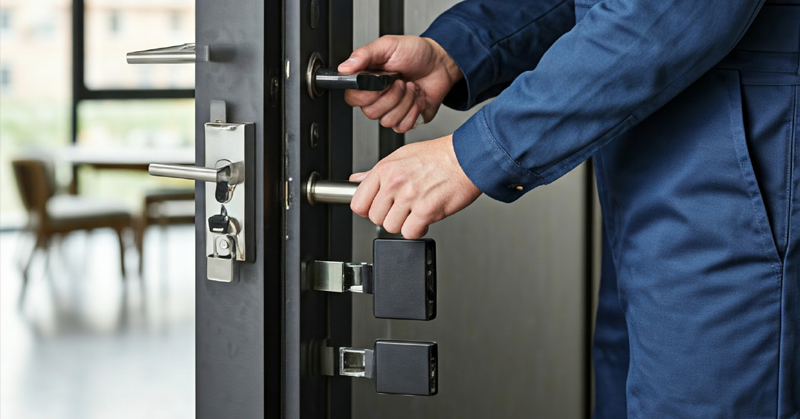Key Maintenance Tips: How to Extend the Life of Your Locks and Keys
/in Locksmith Help /by Alexa UrbinaLocks and keys are fundamental to our daily security, yet we often overlook their care until something goes wrong. Just as you’d service a car or perform routine maintenance on appliances, giving a bit of attention to your locks and keys can prevent frustrating lockouts, expensive repairs, and compromised security.
In this guide, we’ll explore practical tips to help you keep your locks and keys functioning smoothly for years to come. With just a few proactive steps, you can reduce wear and tear, maintain reliability, and ensure that your doors remain secure.
1. Keep Your Keys Clean and Dry
 Why It Matters:
Why It Matters:
Keys pick up dirt, lint, and moisture from pockets, purses, and everyday use. Over time, debris can transfer to your lock’s internal mechanisms, causing friction and hindering smooth operation.
What to Do:
- Wipe Down Keys Regularly: Use a soft cloth to remove dust or residue. If your keys are visibly dirty, a gentle rinse with warm, soapy water followed by thorough drying is a simple solution.
- Avoid Harsh Chemicals: Stick to mild cleaning solutions. Strong chemicals can corrode metal and damage protective finishes.
2. Lubricate Your Locks Appropriately
 Why It Matters:
Why It Matters:
Locks consist of intricate pins, springs, and internal components that must move freely. Without proper lubrication, they can become stiff, increasing the risk of key breakage or lock failure.
What to Do:
- Use a Graphite-Based Lubricant or Lock-Specific Spray: Unlike oils, which can attract dirt and gum up, graphite or silicone-based lubricants are designed for locks. Apply sparingly—just a quick spray or a puff of graphite powder is enough.
- Annual Maintenance: Lubricate your locks every 6-12 months, or more often if you live in a dusty or humid environment like Houston. A short, routine lubrication can add years to your lock’s life.
3. Handle Keys with Care
 Why It Matters:
Why It Matters:
Keys aren’t designed to withstand heavy force. Using them as makeshift tools—like prying open packages or acting as a bottle opener—can bend or weaken them, making it more likely they’ll snap off in a lock.
What to Do:
- Use Keys Only for Their Intended Purpose: Reserve that energy for dedicated tools. If a lock is sticking, don’t force the key—address the root cause instead.
- Avoid Excess Weight on Your Keychain: A large bundle of keys and accessories adds stress to your car’s ignition and can wear down house keys. Keep it simple and streamlined.
4. Store Spare Keys Wisely
 Why It Matters:
Why It Matters:
Spare keys are a safety net, ensuring you have access if you lose your primary set. However, poor storage can lead to damage, rust, or unauthorized access.
What to Do:
- Use a Protective Case or Holder: Keep spare keys in a dry, indoor location. If you store them outside, consider a weatherproof lockbox.
- Check Spare Keys Periodically: Even unused keys can collect dust and moisture. Examine spares every few months and clean or dry them if needed.
5. Address Issues Early
 Why It Matters:
Why It Matters:
A lock that’s getting harder to turn or a key that feels “off” is often a cry for help. Ignoring small issues can lead to broken keys, jammed locks, and emergency callouts at inconvenient times.
What to Do:
- Don’t Force a Key: If it won’t turn smoothly, stop and investigate. Try cleaning the key, lubricating the lock, or checking for visible damage.
- Call a Professional Before It’s Urgent: If lubrication and basic cleaning don’t solve the problem, contact a reputable locksmith. A quick, non-emergency repair can save you from costly fixes down the road.
6. Protect Locks from the Elements
 Why It Matters:
Why It Matters:
Locks on exterior doors, gates, or sheds face constant exposure to humidity, dust, rain, and temperature fluctuations. These conditions can accelerate wear, rust, and corrosion.
What to Do:
- Use Weather-Resistant Locks: If you live in a humid climate or near the coast, invest in locks designed to withstand the elements.
- Apply Rust Inhibitors: Occasional treatment with rust inhibitors or specialized lock protectants can prolong the life of locks exposed to weather extremes.
- Install Protective Hardware: Consider adding a door awning or a shield to keep rain and direct sunlight off the lock.
7. Invest in Quality Locks and Keys
 Why It Matters:
Why It Matters:
The old saying “you get what you pay for” applies to locks and keys. Cheaper, low-quality locks often wear out faster, offering less security and demanding more frequent repairs.
What to Do:
- Choose Reputable Brands: Opt for well-known lock manufacturers like Schlage, Kwikset, or Medeco. These brands offer reliable hardware tested against rigorous standards.
- High-Quality Keys: Getting your keys cut at a reputable locksmith ensures precise duplication. Poorly cut keys can damage lock mechanisms over time.
8. Reconsider Lock Upgrades Periodically
 Why It Matters:
Why It Matters:
As locks age, the internal mechanisms can wear out even with the best care. Plus, security standards evolve over time, and upgrading may prevent future issues and enhance safety.
What to Do:
- Upgrade to High-Security Options: Consider high-security locks or smart locks if your current hardware shows signs of wear.
- Schedule Inspections: A professional locksmith can assess your current locks, recommend preventive maintenance, and advise when a replacement might be more cost-effective than continual upkeep.
10. Have a Trusted Locksmith on Speed Dial
 Why It Matters:
Why It Matters:
Even well-maintained locks and keys can fail unexpectedly. Having a trustworthy locksmith ready to assist ensures you’re never left stranded.
What to Do:
- Research in Advance: Look for a licensed, insured locksmith with positive local reviews. Save their contact information for emergencies.
- Regular Check-Ins: Establishing a relationship with a local locksmith means you can schedule routine maintenance and get advice on prolonging the life of your locks and keys.
Conclusion: A Little Care Goes a Long Way
Locks and keys work hard every day, silently securing your home, belongings, and loved ones. By investing just a bit of time in cleaning, lubrication, and proper handling, you can significantly extend their lifespan. Preventive measures, quality hardware, and occasional professional attention can help avoid unnecessary hassles, costs, and security risks.
For professional advice, routine maintenance, or quick repairs, contact First Class Locksmith. Our team of experienced technicians is dedicated to keeping your locks and keys in top shape, so you can enjoy the peace of mind that comes with well-maintained security.



